Autopsy of Irish Rugby's February nightmare

It’s curious how Joe Schmidt will seek out the sanctuary of Brexit territory later this week to try and solve the intriguing February problem of his suddenly misfiring Ireland team.
A camp in Belfast is the next rendezvous on his squad’s schedule and it will be there, on the other side of a border that has been a crux in agreeing Britain’s exit from the European Union, where he will attempt to rally his troops in the hope they can play their way out of an uncharacteristic performance slump.
Fourteen weeks after feeling on top of the world following the Dublin ambush of New Zealand, the emotions currently surrounding the Schmidt camp occupy a very different end of the spectrum.
It’s a rare event to see them at this low an ebb, their confidence undermined and their play muddled and inaccurate. The only other occasion during the New Zealander’s 65-match reign where there was a comparable drop-off in levels took place three years ago.
They had a valid excuse back then. Their winless three-game, February 2016 sequence – the first time in the championship since 1998 that they had been winless after three matches – was effectively a World Cup hangover following on from the previous October’s quarter-final elimination versus Argentina.
(Continue reading below…)
Watch: Willie John McBride and Bill Beaumont receive honours
But this current slump has no similar get-out-of-jail-free card. Ireland came into 2019 at the top of their game, ready to take on all pretenders to their championship throne before taking their good vibes across to the Far East and create history at the next World Cup.
Their unfolding dose of the yips, though, is a reminder of what can negatively happen when your are reigning Grand Slam champions and feeling so invincible on the back of a multitude of awards and praise. You can quickly lose your way if you’re not careful.
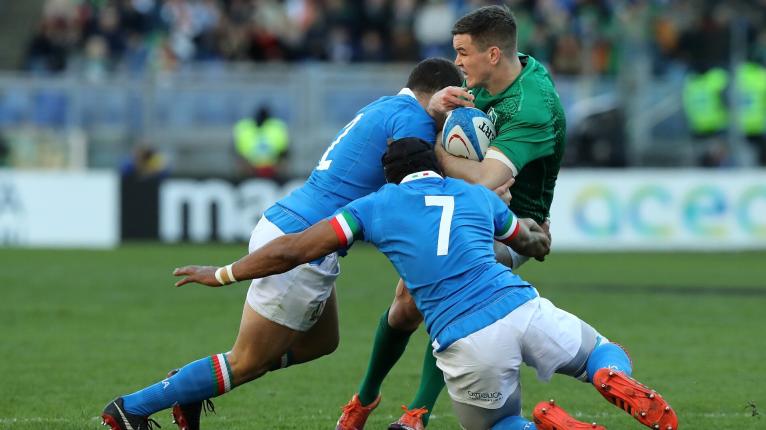
A decade ago, Ireland cruised through 2009 unbeaten in 10 matches but they fell in love with themselves on that back of that success and all the celebrity that came with it. Just five of 11 matches were won the following year, seven of the performances leaving much to be desired.
Staying positive was what pulled Schmidt through his own previous slump, an insipid home draw with Wales followed by ugly losses away to France and England. “Any hesitation at this level is a recipe for disaster,” he said at the time. “We have got to maintain our confidence, keep our heads up, roll our sleeves up and go again… it hasn’t been smooth sailing but that builds a bit of character.”
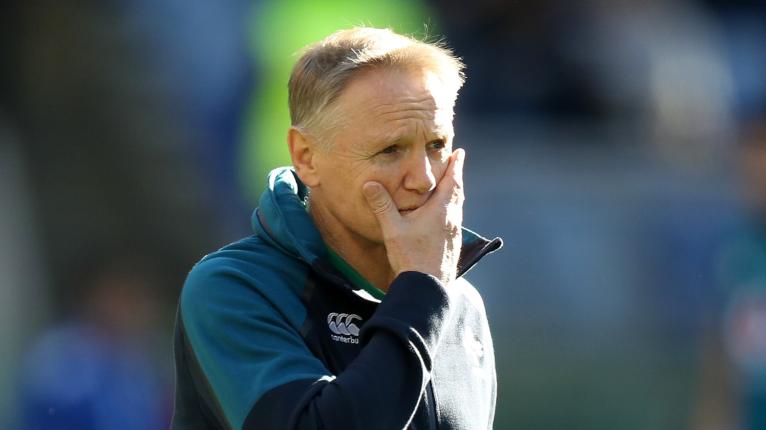
The next few weeks will reveal so much more about the character of Schmidt’s current bunch of players – and even the coach himself. It doesn’t at all tally that a team which stopped the nation with its exploits versus New Zealand can now so quickly appear out of sorts and struggling for form.
If the tumble isn’t rectified in their next outing, the March 10 hosting of France in Dublin, it will be high time to query if Schmidt’s post-New Zealand revelation that he is to quit his Ireland post at the end of the 2019 World Cup has unwittingly had a negative effect on his ability to prise the best from his charges.
Watch: Joe Schmidt & @peterom6 at Ireland's post-match press conference#TeamOfUs #ITAvIRE #ShoulderToShoulder https://t.co/0SaMmFHHmD pic.twitter.com/hdmpMv69bT
— Irish Rugby (@IrishRugby) February 25, 2019
It’s a weird situation for Irish rugby. Not only to have a coach announce his intention to step down 12 months in advance of his exit, but to also nail to the mast who his predecessor will be.
The IRFU’s way had previously been to fire the incumbent and only then recruit a replacement, but we already know well in advance that assistant Andy Farrell will be promoted on this occasion. Has this long-term planning privately rankled with some people and affected performance? It’s a theory that will gain legs if displays don’t quickly get better.
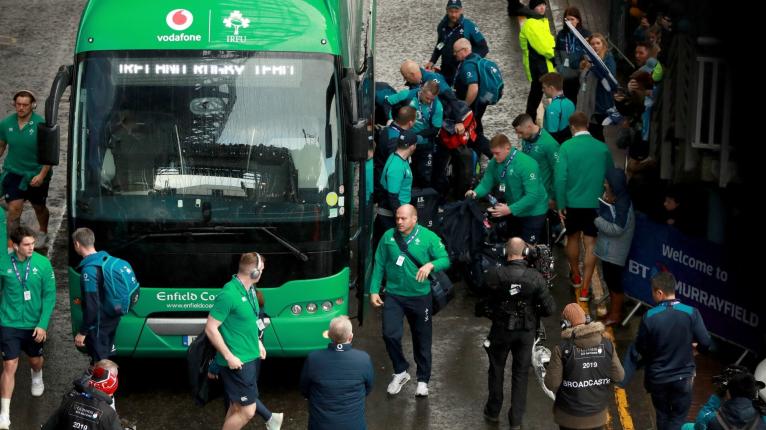
Sift through the evidence of February’s pedestrian 240 minutes and the main takeaway is that too many of Ireland’s more established players didn’t look their reliable old selves. Rob Kearney, Johnny Sexton, Conor Murray and Sean O’Brien were nowhere near their world-class standards and it had a draining effect.
Kearney was unable to help better shut the defensive door when the scramble was on to prevent serial losers Italy from scoring two tries in a bizarre five-minute spell in Rome. Sexton and Murray have oozed narkiness with their body language.
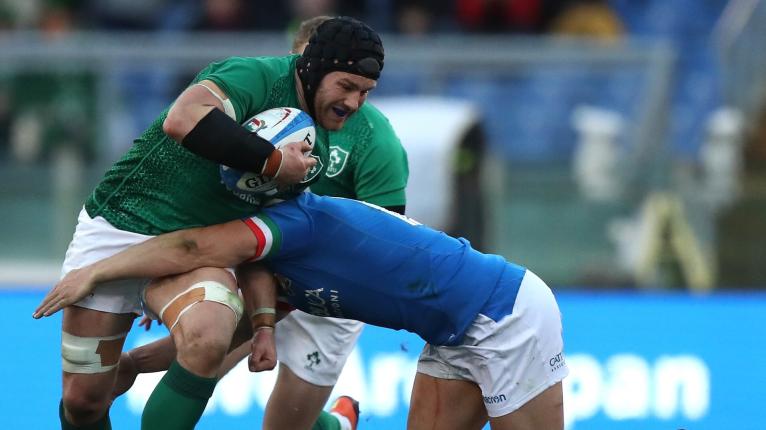
It’s a deflating mood not help by the increased physical attention the 2018 World Player of the Year has attracted, nor by the scrum-half’s sudden box-kicking inaccuracy and multiple handling errors.
As for O’Brien, he has failed to escape all the wear and tear of too many injuries and he has looked very ordinary. His concession of three penalties in a 12-minute spell invited Italy to fight their way back from a poor start and be ahead by the interval.
Given the February pattern of underperformance, the worry is that Ireland’s back row has been found out. Against England, Peter O’Mahony and CJ Stander were successful in crossing the gain line on a respective 38% and 36% of their combined total of 19 carries.
Versus Scotland, O’Brien and O’Mahony each had only a 50% success rate for their 27 carries, while over in Rome O’Brien was limited to a 43% success and Jordi Murphy 57% on their 21 carries.
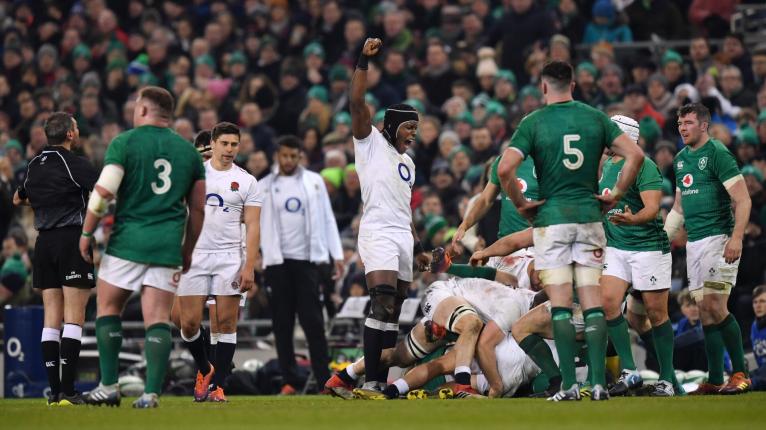
That is nowhere near a high enough success rate for a back row that appears to be suffering from a selection imbalance, and their lack of dominant physicality is a hugely contributory reason why Ireland’s collective figures for taking possession over the gainline came in at 45% against England, 38% in Scotland and 51% at Italy.
The impression is that the approach of Schmidt – who showed he is human by getting wrong his selection of Robbie Henshaw to start at full-back against England and Sean Cronin as starting hooker in Italy – is being worked out by the opposition.
It’s as if after burning the midnight oil night after night this winter, rival coaches can now confidently predict what the prime Irish ball carriers will try and do and they have strategised accordingly to limit their influence.
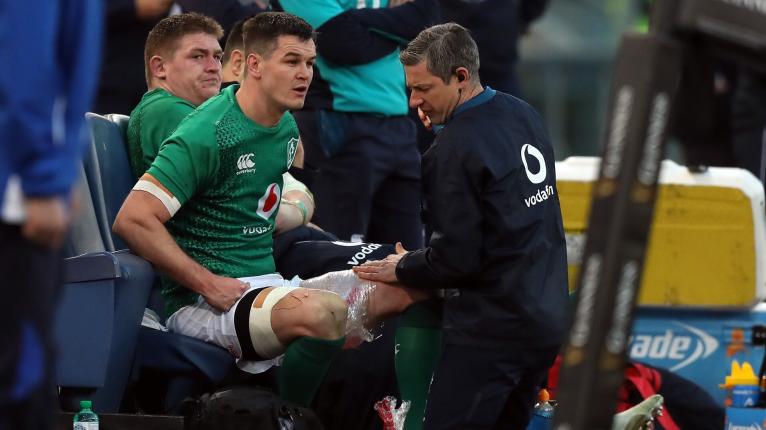
Look, for instance, at Tadhg Furlong’s gainline statistics when carrying the ball a total of 34 times – a massively effective operator throughout 2018, he has only had a 45%, 38% and 51% success rate in his three recent outings which is costly.
Overall, the team’s all-round ability to secure better go-forward has checked their 2018 swagger, Ireland restricted to just 36% territory in Dublin, and 40% and 47% in Edinburgh and Rome. You can’t create all that much when forced to play so much in your own half. It has to change.
Round 3 complete, with Wales sitting pretty at the summit ???????
How do you think this table will look at the end of the Championship?#GuinnessSixNations pic.twitter.com/uX4sf4FJuk
— Guinness Men's Six Nations (@SixNationsRugby) February 24, 2019
One of Schmidt’s most repeated sayings during his six-year reign is that ‘nothing is every linear’ and Ireland’s unexpected downward spiral this past month illustrates this precisely.
There are always up and down periods and this particular down, which hasn’t been helped injuries that have placed a question over Ireland’s alleged strength in depth, isn’t a confirmed crisis yet.
Unlike in 2016, when they were already out of the title race just three games in, they have still wrangled two winning results that keep them in the hunt to retain their hard-won trophy from 2018.
Beat France with an improved display and they can head to Cardiff with their chances still very much alive. That is no bad prospect given the grim spectacles of a best-forgotten February.
























Comments on RugbyPass
Best thing the Welsh clubs could do is apply to join Gallagher prem surely be more exciting matches for there support than they have now.
2 Go to commentsRugbyPass writers are useless! you guys should get a real job because you all suck at writing about rugby!!!
8 Go to commentslooking forward to RWC2027 …. Boks on mission impossible for the Three-in-a-row, ABs to prove they being on par, France wishing to crown the “DuPont-era”, Ireland knocking on the Semi-Door ….. until then we’ll probably have to deal with Weird Ben’s fantasy-RWC23 (fun fact is, the drivel always creates a flooding of comments) …..
221 Go to commentsBen Smith you really make some good points in this article, the Springboks were not close to perfect and good still beat the All Blacks, imagine if they were as good as they were against France what a hiding the All Blacks would have gotten… maybe another Twickenham drubbing
221 Go to commentsIt is a good argument to keep the Rebels for one more year but also isnt this just opening the door as well for keeping them beyond 2025. If they can create some sort of financial stability in the next year and if their performances lift as they have this season then how would RA even cull them after that? It might be the most cost effective decision at this stage and perhaps many people are guilty of keeping relationships going because of the cost to decouple but then again when does that ever work out well?
21 Go to commentsDear Ben Smith you are a genius! God please become the next all blacks coach that can take on the mighty BOKS. Your rugby acumen is second to none - imagine your dads sperm bounced as unfortunately as that oval ball did….we would not be blessed with your presence. Just as the all blacks were missing a man you too are missing a chromosome for 80% of your life, so your insights are not only profound but ring true from your own experiences. Just as the TMO interfered with citing an illegal pass I am sure your local authorities interfere with your illegal passes you make on women - How dare they!!! God forbid that rugby be officiated fairly. You are the right man for the job. Next all blacks coach is here ladies and gentlemen Miss Ben Smith (He/She/They/IT)
221 Go to commentsHuge engine this guy and great to see him back ..The amount of clean outs he does at the ruck are ridiculous !!
3 Go to commentsThe level of desperation in this article is just embarrassing.
221 Go to commentsSome silly trolling in the comments.
9 Go to commentsEverywhere you turn some irish journo is advocating Ireland as the greatest, reasoning that the wc is a 4 year cycle event so, they say wc doesn’t matter it’s the rugby in between that should account for the accolade. If there was no wc then some substance could be gained, however in my opinion the moment that defined Ireland’s fate against the abs was 37 phases of repeated head bashing against a brick wall. If a change in strategy or a tinker with the game plan was executed then things could've been vastly different. And to point a finger the let down was in the hands of the number 10.
64 Go to commentsI have heard it asked if RA is essentially one of the part owners and I suppose therefor should be on the other side of these two parties. If they purchased the rebels and guaranteed them, and are responsible enough they incur Rebels penalties, where is this line drawn? Seems rough to have to pay a penalty for something were your involvement sees you on the side of the conned party, the creditors. If the Rebels directors themselves have given the club their money, 6mil worth right, why aren’t they also listed as sitting with RA and the Tax office? And the legal threat was either way, new Rebels or defunct, I can’t see how RA assume the threat was less likely enough to warrant comment about it in this article. Surely RA ignore that and only worry about whether they can defend it or not, which they have reported as being comfortable with. So in effect wouldn’t it be more accurate to say there is no further legal threat (or worry) in denying the deal. Unless the directors have reneged on that. > Returns of a Japanese team or even Argentinean side, the Jaguares, were said to be on the cards, as were the ideas of standing up brand new teams in Hawaii or even Los Angeles – crazy ideas that seemingly forgot the time zone issues often cited as a turn-off for viewers when the competition contained teams from South Africa. Those timezones are great for SR and are what will probably be needed to unlock its future (cant see it remaining without _atleast _help from Aus), day games here are night games on the West Coast of america, were potential viewers triple, win win. With one of the best and easiest ways to unlock that being to play games or a host a team there. Less good the further across Aus you get though. Jaguares wouldn’t be the same Jaguares, but I still would think it’s better having them than keeping the Rebels. The other options aren’t really realistic 25’ options, no. From reading this authors last article I think if the new board can get the investment they seem to be confident in, you keeping them simply for the amount of money they’ll be investing in the game. Then ditch them later if they’re not good enough without such a high budget. Use them to get Jaguares reintergration stronger, with more key players on board, and have success drive success.
21 Go to commentsYeah, and ours is waaay bigger than yours. Just as you's get a semi…oh hold on that never happens
64 Go to commentsLove watching
1 Go to commentsThe Melbourne Rebels lineout is a complete disaster so not surprisingly a kiwi coach of the Wallabies hires the worst lineout coach in the country and a foreigner to boot. No surprises whatsoever here…….
6 Go to commentsThank your for wasting 2 minutes of my life Daniel. There is a useful message in there somewhere but your delivery sucks.
8 Go to commentsBen Smith, you are cry baby
221 Go to commentsSux that homophobia is still a thing though. I wonder how many players who could have become legends never kept playing rugby because they felt unwelcome.
8 Go to commentsCrazy he’s only 28, feel like he’s been around forever - don’t mind the move, safe pair of hands and creates depth in a thin position for ABs. Hopefully aides Kemara’s growth also without thrusting too much responsibility on him
1 Go to commentsMen should show strength and be mean, but they should be able to show emotion to those close yo them in certain times, birth of your child, death of family, proud moment. This article is stupid
8 Go to commentsWhat a weak article…absolute drivel and clickbait, well done. Will stick to rugby365 thanks
8 Go to comments